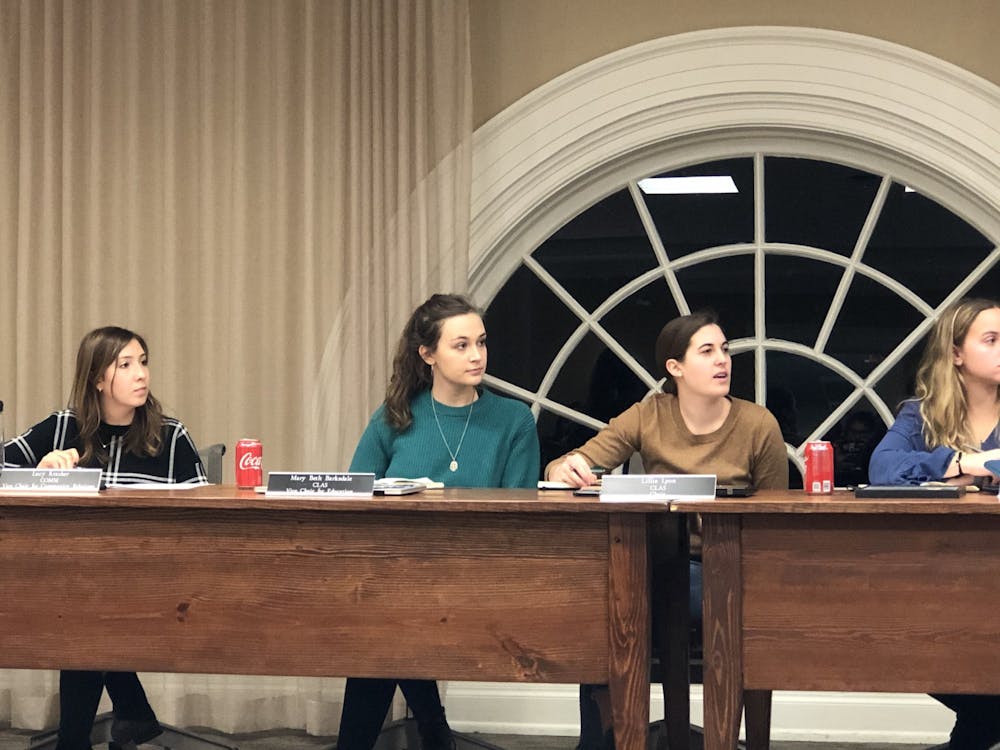The Honor Committee distributed an open invite to its weekly meeting to the University community via social media as part of their Popular Assembly initiative — a biannual effort required by Honor’s constitution to educate students and encourage their engagement with the Honor system and its leaders.
The community events, which began Wednesday and ended Sunday with the meeting, marked the third ever Popular Assembly.
About 60 people — including students both affiliated and unaffiliated with Honor — attended the meeting, which offered free Insomnia Cookies, mugs and t-shirts.
The Committee discussed amending the Honor Committee bylaws to allow both counsel in an Honor case to make a motion to amend the disposition in front of a pre-hearing panel prior to the trial. The disposition refers to the language produced by an investigative panel that explains the accusations against a student.
Harper North, a fourth-year Batten student and Honor Committee representative, is part of the policies and procedures subcommittee that is drafting the new bylaw language. In an interview after the meeting, North said the amendment was intended to make the process more fair.
“We currently have no mechanism in place if there is an investigative panel disposition that just is not in line with our standards and compromise the rights of the student there's nothing we can do about it,” North said. “So the purpose of this policy is to give us some way to intervene before the hearing, to make sure that every accusation going to hearing is there for the student to defend themselves against it.”
During discussion of the proposal, Sally Greenberg, Honor Committee vice chair for investigations and a fourth-year Engineering student, raised several concerns about the proposed amendment, including whether the goal of the proposal could be accomplished with better training of investigative panelists.
She stressed that the language of the proposal must be tailored to protect students’ rights without restraining the Committee.
“There is always an opportunity to abuse something new, and especially when implementing something, we want to make sure we're putting it with the correct language with our correct idea, so that in five or 10 years in the future, the committee of that time and the vice chair for investigation of that time are not misunderstanding or thinking we met one thing when we didn't,” Greenberg said.
North said the subcommittee is currently drafting language with the committee’s feedback and added that she hopes the proposal passes by the end of the semester.
The Committee also voted unanimously to adopt a new code of ethics, adding a policy that requires Honor Committee members and support officers to notify the Committee if they become subject to disciplinary processes outside the Honor system.
“The committee has been talking for probably a month now about both how to amend our code of ethics and also introducing a new policy to compel support officers and Committee members to disclose to the Committee when they become subject to other disciplinary procedures, whether that be UJC, Title IX or something outside the University,” said Lillie Lyon, Honor Committee chair and fourth-year College student.
The adoption is effective immediately.
Mary Beth Barksdale, a fourth-year College student and Honor Committee vice chair for education, said the Popular Assembly was very successful, noting that several events attracted more than 100 people.
“It has been an incredible week so far to see so many people engaged in Honor and to hear from so many people,” Barksdale said.
Greenberg read from a letter the Seven Society sent the Committee celebrating the Popular Assembly.
“This year’s Popular Assembly serves as a noteworthy reminder that the Honor Committee, like our Commonwealth, draws its strength from regularly reaffirming the foundational values for which it stands,” the letter read. “While it represents only one of the many ways the Honor Committee fosters dialogue within the student body, the Popular Assembly is a particularly public demonstration of the most central tenet of the Honor system and the source of its enduring strength — student self-governance.”
On Wednesday, the Honor Committee held the Popular Assembly’s first event, a meet and greet with community leaders on the South Lawn. On Thursday, they hosted a debate on the state of the Honor system in Jefferson Hall, and on Friday, they invited faculty members to give their perspectives on the Honor system in the West Range’s Garden Room. On Saturday, the Committee held a social media campaign, posting community members’ answers to the question, “What do you honor?” on their Facebook account.







